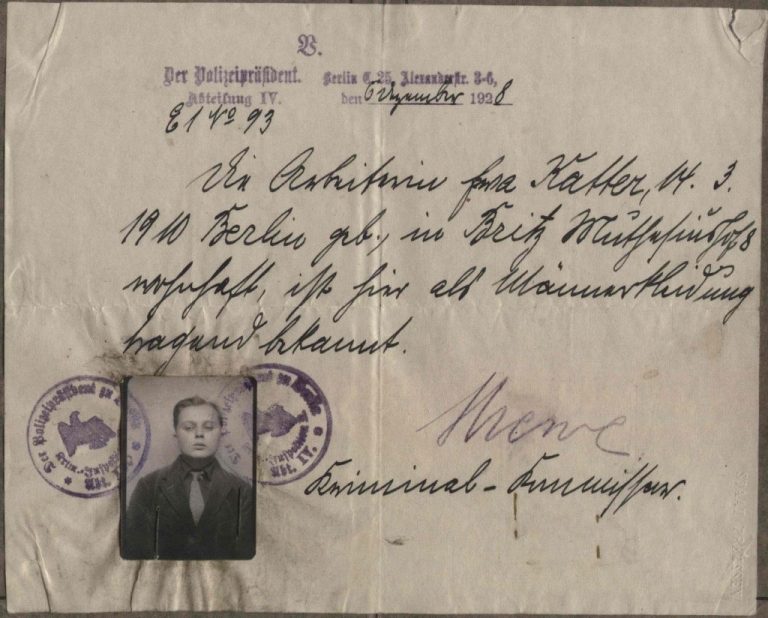Due to the COVID-19 pandemic, this lecture has been moved to a virtual format. Information on joining the session is below.
“On Looking and Being Seen: Thinking With and Beyond Identity in Queer and Trans German Studies”
Dr. Katie Sutton
Australian National University
April 24, 2020
3:30 p.m. PDT
The guest link to join the session is https://bit.ly/3ayhHzJ.


Abstract:
In the passport photograph on his Weimar-era Transvestitenschein, a besuited Gerd Katter gazes out past the camera’s lens, refusing to fully expose himself to either the authorities on whom his ID application relied, or to viewers across the century since. Starting with a series of such early 20th-century legal, medical, and subcultural photographs, this paper engages with theories of identity, visibility, and affect to articulate some cornerstones for an ethics of looking and being seen in queer and trans German history and cultural studies. What is at stake in designating photographs of historical individuals as “objects” for queer and trans studies? Which “objects” do we include? How have feelings such as shame and desire (Evans, Love, Probyn) shaped the conditions under which queer and trans bodies were placed on display? The ways in which we respond to such ethical conundrums, I suggest, can also shed light on current debates in German LGBTQ studies, including the relationship between media visibility and transphobia, Holocaust memorialization, and “free speech” justifications of anti-Islamic discourses. By cultivating a queer and trans ethics of “attentiveness” (Berlant, Breger) that insists on careful looking and attending to feelings, we might find productive new ways for thinking with and beyond identity.
Dr. Katie Sutton is Senior Lecturer in German and Gender Studies at Australian National University in Canberra. Her first book, The Masculine Woman in Weimar Germany (2011, Berghahn Books), explored the widely-discussed ‘masculinization of woman’ in 1920s German popular culture, in areas such as fashion, sport, literature, cinema, and magazines produced by newly emerging sexual minorities. Her new monograph, Sex between Body and Mind: Psychoanalysis and Sexology in the German-speaking World, 1890s–1930s (2019, University of Michigan Press), is a cultural history of sexuality and medical-scientific sex research examining debates around the sexual life of the child, the nature of shellshock, the origins of homosexuality, trans identity, and the role of the sex hormones. This is the first book to closely examine vital encounters among this era’s German-speaking researchers across their emerging professional and disciplinary boundaries.
This presentation is part of the Ziegler Lecture Series, an annual lecture series offered by the Department of Central, Eastern and Northern European Studies. This is also the keynote lecture for “The Pasts and Futures of Queer German Studies,” a research symposium organized by Dr. Kyle Frackman and Dr. Ervin Malakaj, now taking place virtually April 24–26, 2020.
Image courtesy of the Magnus-Hirschfeld-Gesellschaft e.V. Forschungsstelle zur Geschichte der Sexualwissenschaft



